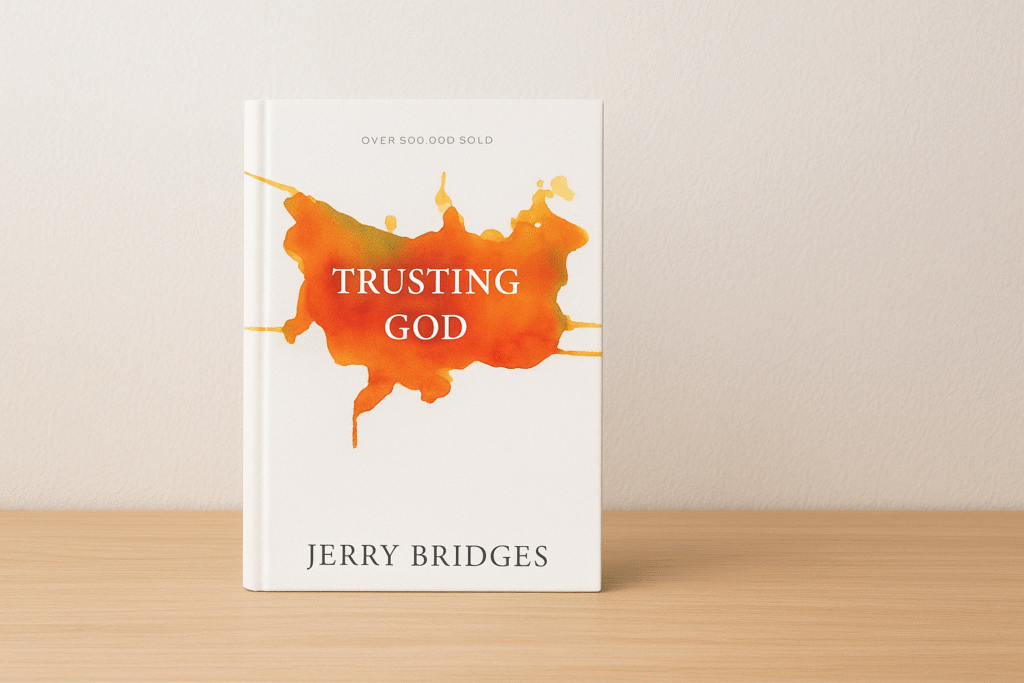Dews of blessings are visitors we like and embrace wholeheartedly. Trials and suffering visits are also inevitable in this christian sojourn, yet we would rather not open the door to them. Even the strongest of christians can crumble under the weight of trials or suffering when clouds gather and the rain beats down hard. In this article, I aim to persuade you, through a review of Jerry Bridges’ book Trusting God, that the most effective way to respond to trials is to ground our hearts in the unchanging character of God.
Bridges holds up a banner of three essential truths about God and calls his readers to sink their teeth into believing that God is: completely sovereign, infinite in wisdom and perfect in love. He summarises these truths with this statement:
“God in His love always wills what is best for us. In His wisdom He always knows what is best, and in His sovereignty He has the power to bring it about”.
I hope to whet your appetite and pique your interest enough to pick up this book and read it. It is definitely worth your while.

Trusting God’s Sovereignty
What comes to your mind when you think about the word ‘sovereign’? The dictionary defines it as a person who has supreme power or authority. Do you ever wonder to what extent the Lord is sovereign? Is He only sovereign in the grand things of life and not over you, even reading this article? Bridges spills a lot of ink in five chapters explaining the extent of God’s sovereignty over His creation and how He exercises that sovereignty.
In that, he has a plethora of scriptures to ground his labour of showing his readers the sweet doctrine of God’s sovereignty. In expounding how the Lord exercises His sovereignty, he writes,
“God doesn’t exercise His sovereignty capriciously, but only in such a way as His infinite love deems best for us.”
He helps his readers rest their hearts in who God is. He points out that all God does is for our good and His glory. Two truths that always work together. It’s not either-or, but both-and. He doesn’t shy away from engaging in humanity’s most bewildering question: If God is good and sovereign, why does He allow evil to manifest in His creation? He doesn’t attempt to cross the boundaries of the answer we find in the Scriptures about God’s sovereign rule, even in tragedies and evil in this fallen world. It is exhausting to try to understand what is infinite for us as humans (Isaiah 55:8-9). So Bridges, like the apostle Paul, takes us by the hand and leads us to rest in God’s wisdom.
Trusting God’s Wisdom
I wonder how Solomon felt to be the wisest man on earth, wisdom bestowed on him from heaven (1 Kings 3:12). We all can agree that there is a wisdom that strikes us and leaves us admiring people. Yet, none of that compares with the wisdom of God. Bridges, in one lengthy chapter, draws his readers in to latch and rest on the wisdom of God in their lives. He audaciously reiterates that God makes no mistakes. In explaining why we ought to trust God in His dealings with our lives, he writes,
“God knows exactly what He intends we become and He knows exactly what circumstances, both good and bad, are necessary to produce that result in our lives.”
We touched on the dilemma that faces all humans of why suffering exists in this world. The apostle Paul commends us, as finite creatures, to trust the wisdom of God on things we don’t comprehend. Yes, we can have some substantial answers like the world is fallen and people are sinful, but we cannot comprehend the magnitude of how God operates in this world. Paul bursts out in doxology as he muses on the wisdom of God. (Romans 11:33-36).
Oh, the depth of the riches of the wisdom and knowledge of God!
In the same way, the best way to respond to trials in life is to trust the wisdom of God, lean on who He is and trust that indeed He makes no mistakes; for His way is perfect (Psalm 18:30). Bridges emphasises that God’s wisdom is fathomless, His decisions are unsearchable, His methods are mysterious and untraceable. No one has ever understood His mind, let alone advised Him on the proper course of action. This doesn’t mean that we can’t approach God with our questions, confusion, pain, disappointment or disillusionment; in fact, He who knows all things perfectly and intimately invites us to His throne to lay our burdens down and promises to meet us there (Hebrews 4:16).
Trusting God’s Love
Imagine with me trusting a God who is sovereign, wise, and not loving at all. I don’t think any of us would want that very much. Bridges argues that even as we embrace God as sovereign and wise, when adversity strikes we may question God’s love for us. He cements this by writing that the Bible doesn’t force us to choose between the sovereignty and the goodness of God but affirms both with equal emphasis (Psalm 115:3; Psalm 145:17).
We tend to look over our shoulder to find reasons why God does and doesn’t love us based on our performance, but Bridges argues that God doesn’t look for reasons to love us because He loves us steadfastly in Christ (Jeremiah 31:3), and therefore, he adds,
God’s love for us cannot fail any more than His love for Christ can fail
(John 17:23).
Bridges devotes two chapters to encouraging his readers that even when life hurts, they should lean in a sturdy way on the steadfast love of God. But if we are honest, this is where the rubber meets the road, right? When life hurts, we are tempted to plummet into doubting God’s love. He exhorts us, “God’s love is an objective truth that cannot be contradicted. But it is truth that we must store away in our minds and hearts. Then we must use it in the midst of adversity to deal with our doubts, combat the accusations of Satan, and glorify God by trusting Him” (Romans 8:38-39).
He doesn’t negate the fact that God disciplines His children, but affirms a discipline done with love (Hebrews 12:6). He says that God disciplines us with reluctance, though He does it faithfully. God does not delight in our adversities, but He will not spare us that which we need to grow more and more into the likeness of His Son (Romans 8:29). It is our imperfect condition that warrants discipline.
To ensure his readers don’t jump ship and conclude that all trials and tragedy are as a result of our sin, he draws from the book of Job, to show that not all of suffering is due to sin (Job 1:8-12), and therefore calls us to trust in the wisdom of God who knows how to sovereignly choose the conditions to grow us to be like Christ.
Trusting God in Daily Life
Bridges wraps up this book with four chapters that apply trusting in God’s character: trusting Him for who you are, growing in godliness through the adversity because you trust God, choosing to trust God with the impetus of who He is, and growing to give thanks always even when life hurts (1 Thessalonians 5:18). God hasn’t and never made any mistakes, He can never do us wrong, and the only way to find true and steady joy and peace is to respond by turning to God and clinging to who He is (Philippians 4:4-7). This, he doesn’t ask us to do by our strength but by the very grace that God abundantly supplies (2 Corinthians 12:9). Who indeed is a God like our God? (Isaiah 40:18)
Are you tempted to think that you can run your life better? Are you tempted to think God has already missed a step or something about your life and needs correction? Are you tempted to think you have derailed God’s plans for your life? Are you tempted to think you need to bounce the ball back and forth with God and show Him how to better plan your life? Bridges’ clarion call for us in this book is to rest from that vain labour and trust in the wisdom of God, who is not only sovereign but also loving.
He beckons us to choose to trust God in our trials and bridge the gap between mind and heart with a growing and unshakable trust in God. I love that he doesn’t present trusting God as something we do overnight, but as a way of life. I would say that every trial, every blessing is an opportunity to learn to trust God and glorify Him therein (Romans 8:28).
Bridges begins and ends his book by asking the reader to ponder these questions:
Can you trust God?
Will you trust God?
May the Lord help us all to grow in giving Him glory by trusting Him, even when we don’t understand (Isaiah 26:4).
